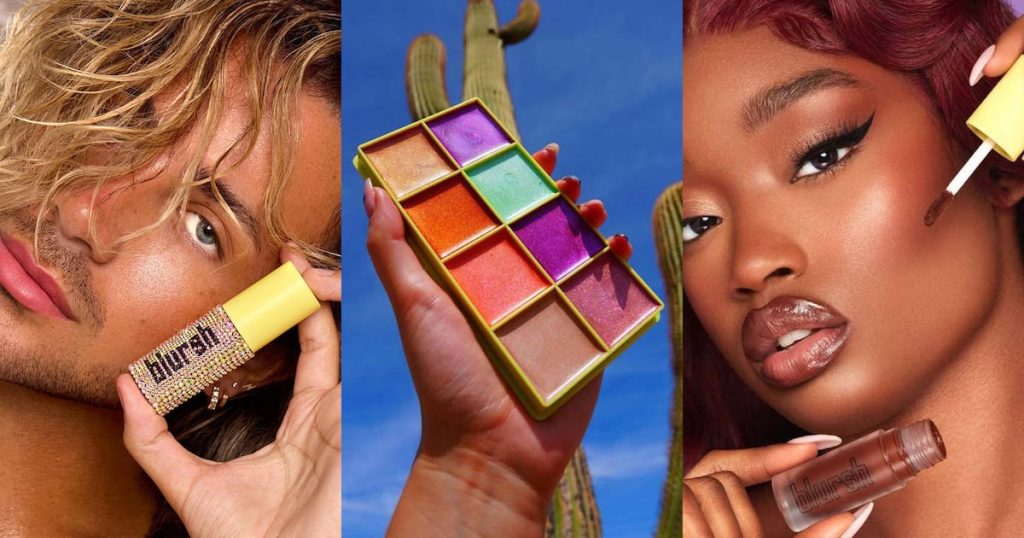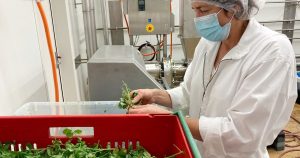
In early 2022, Mitchell Halliday was contemplating the future of his then one-year-old mass cosmetics brand, Made by Mitchell.
Sales were slowing, and the brand’s launch on the British e-tailer Beauty Bay six months prior had cannibalised its direct-to-consumer business. “We had a very scary conversation at the time of just being like, ‘Oh my God, what do we do now? Do we even go forward?’” said Halliday, who launched the line with the serial entrepreneur Marie McGann.
In a last-ditch effort to turn the tide, Halliday decided to try his hand at a livestream on TikTok Shop, which generated only around 20 sales. As the brand was only receiving around 20 sales a month otherwise, Halliday took it as a win and kept at it.
It paid off: in July 2024, Made by Mitchell became the first British company to make $1 million in a single day on TikTok Shop.
“It was this eye-opening moment of realising … we can really turn this around,” said Halliday. Sales are expected to reach around $57 million this year, and currently, around half comes from TikTok Shop.
Now, the brand is looking to make a splash offline, too. Last summer, it launched into 95 branches of the UK drugstore Boots, alongside other buzzy brands like the Korean beauty lines Laneige and Beauty of Joseon. In July this year, it will make its debut in the US — Halliday declined to name the retailer, but said the opportunity had come about after he had made a video where he playfully placed products on shop shelves in one of the retailer’s Miami branches. The video on Made by Mitchell’s page that fits this description shows him in Ulta Beauty. (Ulta Beauty did not respond to a request for comment.)
The brand has a clear aesthetic and point of difference: In a sea of tasteful “clean girl” taupes and beiges, Made by Mitchell is a neon beacon. Much of its packaging is highlighter yellow, featuring a logo scrawled in a chubby, graffiti-esque cursive. The influencers the brand taps for collaborations are more likely to have been on reality shows like Love Island than the front row at New York Fashion Week. Moreover, it offers makeup designed to be noticed and to be seen, such as glittering liquid eyeshadows, rich cream contours and a body highlighter called “Shine Slime”.
But expanding its wholesale presence will stress-test how broad its appeal is. In some ways, the brand’s frenetic energy and rapid growth is inextricably linked with TikTok as a platform. In its early days on TikTok Shop, products could be bought for as little as £1 ($1.26), as the platform subsidised deep discounting to incentivise in-app shoppers. It also has a roaring trade in “mystery bags”, where shoppers pay around $19 for an unknown selection of items, usually valued much higher.
On the shelves at Ulta Beauty — or any other specialty retailer — it will need to be able to hold its own against incumbent players like E.l.f Cosmetics and other high-octane indies like Half Magic and Dibs Beauty. It will also need to grow its overall awareness in the US. The brand receives around 4.1 million views per week on TikTok in the UK, but less than 560,000 in the US, per the social listening firm Spate.
Verified Account
As a makeup artist, influencer and one-time X Factor contestant, Halliday is the perfect candidate for live selling. His theory — which was vindicated — was that showing the products, which include a bright pigmented blusher called Blursh, $18, and a complexion palette called Curve Case, $33, might convert scrollers to shoppers. Aside from Halliday’s compulsively watchable presence and disarming Mancunian accent, the brand has also appealed to Gen-Z through transparent marketing. While some brands focus on posting atmospheric, trendy, “aesthetic” videos, Made by Mitchell’s actually display the products’ performance and colour payoff, said one fan in the The Business of Fashion’s London office.
One of its most popular products, a lightweight foundation called Truth Tint ($21) has been endorsed by the creator Golloria George, the app’s high priestess of inclusivity, who routinely — and deftly — skewers brands for their lack of diverse shade ranges. “That’s what you call an undertone, baddie!” George exclaims in the video. (Halliday responded with an emotional message of gratitude on his own page).
Lisa Payne, head of beauty at the trends agency Stylus said the brand had made space for itself by targeting a consumer who favors results over trends. “[The brand is] not necessarily focused on skincare-infused makeup, for example,” said Payne. “They’re more concerned about just getting colour and good textures into the hands of people very affordably.”
For example, what Hailey Bieber’s Rhode calls a Peptide Lip Shape, Made by Mitchell calls a lip liner — at $11 versus Rhode’s $24.
Outgrown Roots
TikTok is not the real world — trends and brands that seem ubiquitous on the platform are not often sported by everyday shoppers or recognised in the mainstream. That could work in Made by Mitchell’s favour. Halliday is hoping that there’s still plenty of consumers whose first experience of the brand isn’t seeing it (perhaps at a huge discount) on TikTok Shop, but in a store, where they already stock up on brands they know and trust.
“There’s different consumers in all different parts of the shopping space,” said Halliday. “There’s a lot of people that will not buy things on TikTop Shop. It’s just not their choice,” he said.
Payne said the brand’s core tenets of affordability and accessibility have helped insulate them from being buffeted around too much by trendiness. “Having had super cheap products [on TikTok Shop] won’t be problematic for them… they’ve never tried to say they’re an ultra-luxury brand,” she said. As long as the brand doesn’t attempt to raise prices too high or remove discounting altogether, the strategy should be effective, Payne added.
With a possible ban of the app looming in the U.S, the brand’s new focus market, Halliday said TikTok is a way to make noise, rather than build its future. At the moment, TikTop Shop revenue is about 60 percent of the brand’s sales, but Halliday said further expansion into wholesale and deepening its DTC will start to change the split.
“Nothing is forever,” said Halliday of the app’s possible closure. “You’ve got to be ready to switch it up quickly. And I think we have displayed that,” he said.
In store at any major beauty retailer, Made by Mitchell will stand out. When discounted — at time of writing, many products on its website were shown as priced between 20–30 percent off — its price point is closer to E.l.f Cosmetics, its branding more reminiscent of the noughties rebellious brands Lime Crime and Urban Decay, and its proposition is more around “paint and play”, as Payne put it, than refined nonchalance.
Halliday thinks the maximalist ethos will give the brand more staying power.
“You can’t be a cool girl forever,” said Halliday. “We embody the freaks and the geeks… and the cool girls, if they ever want to come to this side of the pond.”
Sign up to The Business of Beauty newsletter, your complimentary, must-read source for the day’s most important beauty and wellness news and analysis.








